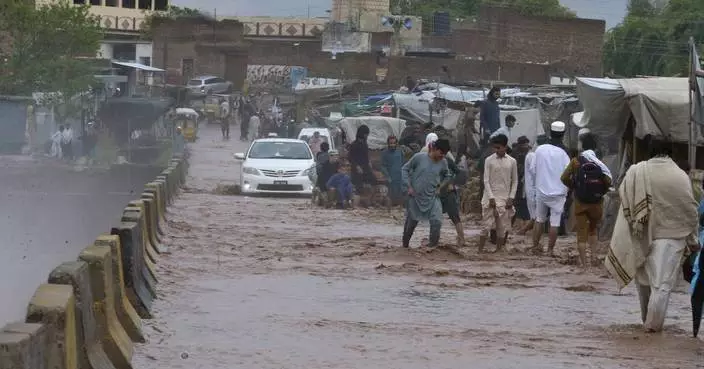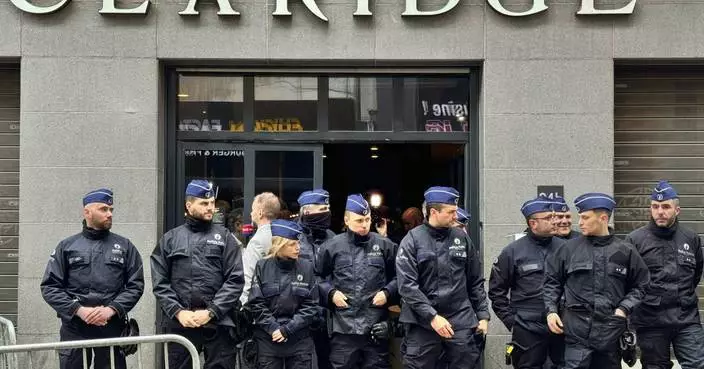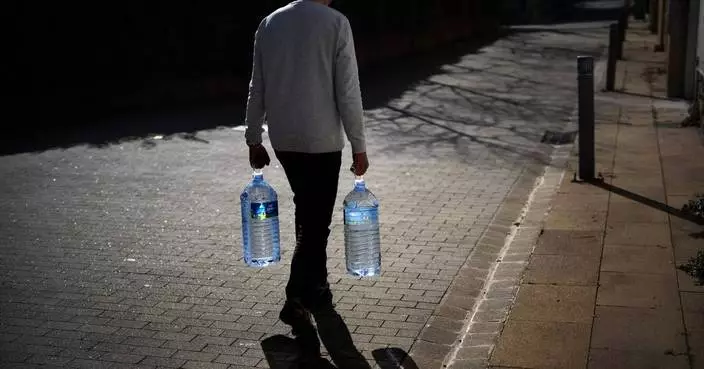Facebook CEO Mark Zuckerberg faced tough questions from European Union lawmakers Tuesday over what one of them branded Zuckerberg's "digital monster," and he apologized for the way the social network has been used to produce fake news, interfere in elections and sweep up people's personal data.
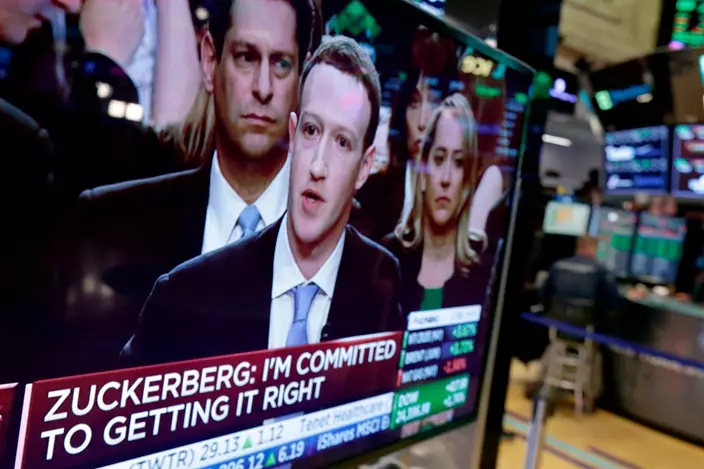
FILE - In this April 10, 2018 file photo, Facebook CEO Mark Zuckerberg appears on a television screen on the floor of the New York Stock Exchange as he testifies in the Senate in Washington. Shares in the social media giant are trading around $185 early Friday, May 11, returning to the levels last seen eight weeks ago, when news broke that the company failed to prevent major privacy breaches during the run-up to the 2016 presidential election in the U.S.
(AP Photo/Richard Drew, File)
At a hearing in the European Parliament in Brussels, legislators sought explanations about the growing number of false Facebook accounts and whether Facebook will comply with new EU privacy rules, but many were left frustrated by Zuckerberg's lack of answers.
Click to Gallery
Facebook CEO Mark Zuckerberg faced tough questions from European Union lawmakers Tuesday over what one of them branded Zuckerberg's "digital monster," and he apologized for the way the social network has been used to produce fake news, interfere in elections and sweep up people's personal data.
At a hearing in the European Parliament in Brussels, legislators sought explanations about the growing number of false Facebook accounts and whether Facebook will comply with new EU privacy rules, but many were left frustrated by Zuckerberg's lack of answers.
As a result, he was able to avoid giving some answers and ran out of time to provide others.
"That was a mistake, and I'm sorry for it," he added during the hearing, which ran just over an hour and a half.
"We are at the crossroads, and in a critical situation, because your business practices touch upon two basic values of our societies," Bullmann said. "First of all, the personal data which became perhaps the most important asset in modern media society. And secondly, on the right of self-government of sovereign nations."
After short opening remarks, Zuckerberg listened to all the questions first, and then responded to them all at once. There was no back-and-forth with lawmakers, as happened during his testimony in front of the U.S. Congress last month.

FILE- In this March 29, 2018, file photo the logo for Facebook appears on screens at the Nasdaq MarketSite in New York's Times Square. Many companies large and small are updating their privacy policies and service terms to comply with upcoming European Union rules governing data and privacy. In preparation for GDPR, Facebook in March updated its privacy controls in hopes of making them easier to find and understand. (AP Photo/Richard Drew, File)
As a result, he was able to avoid giving some answers and ran out of time to provide others.
His appearance came at a difficult time for Facebook. In March it was alleged that political consulting firm Cambridge Analytica used the data of millions of Facebook users to target voters during political campaigns, including the one that brought Donald Trump to the presidency.
Whether it was "fake news, foreign interference in elections and developers misusing people's information," Zuckerberg said, "we didn't take a broad enough view of our responsibilities."
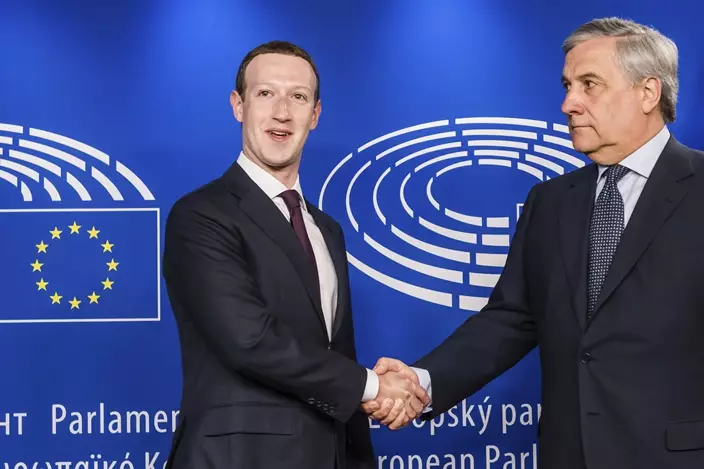
European Parliament President Antonio Tajani, right, welcomes Facebook CEO Mark Zuckerberg upon his arrival at the EU Parliament in Brussels on Tuesday, May 22, 2018. Facebook CEO Mark Zuckerberg faces senior European Union lawmakers today to answer questions about a scandal over the alleged misuse of the data of millions of Facebook users. (AP Photo/Geert Vanden Wijngaert)
"That was a mistake, and I'm sorry for it," he added during the hearing, which ran just over an hour and a half.
But liberal leader Guy Verhofstadt said Zuckerberg has done enough apologizing for his company's mistakes. He said the real question is: "Are you capable to fix it?"
Verhofstadt asked whether Zuckerberg wanted to be remembered like computer legends Bill Gates and Steve Jobs, "who have enriched our world and our societies," or as "a genius who created a digital monster that is destroying our democracies and our societies."
Socialist leader Udo Bullmann demanded an explanation for how the number of false Facebook accounts can be on the rise and what is being done to stop them being used to manipulate elections.
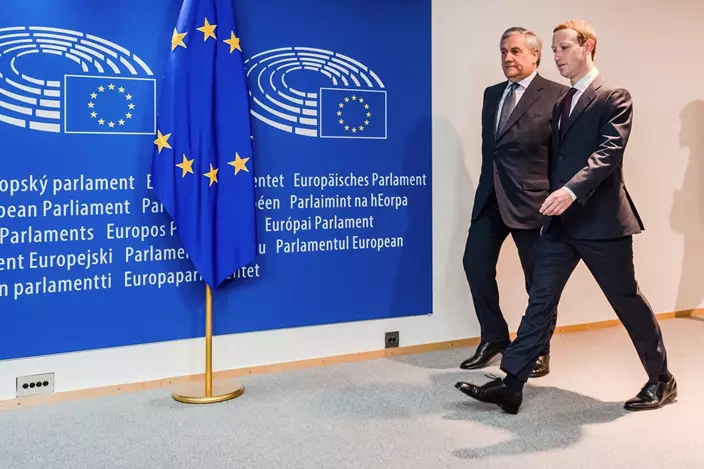
European Parliament President Antonio Tajani, background, walks with Facebook CEO Mark Zuckerberg upon his arrival at the EU Parliament in Brussels, Tuesday, May 22, 2018. (AP Photo/Geert Vanden Wijngaert)
"We are at the crossroads, and in a critical situation, because your business practices touch upon two basic values of our societies," Bullmann said. "First of all, the personal data which became perhaps the most important asset in modern media society. And secondly, on the right of self-government of sovereign nations."
Zuckerberg said Facebook is strengthening cooperation with national election authorities and trying to introduce more transparency about who is running political advertising.
"This is one of our top priorities as a company," he told the lawmakers. He said the goal is to build more artificial-intelligence tools to identify fake accounts and to take them down.

European Parliament President Antonio Tajani, right, welcomes Facebook CEO Mark Zuckerberg upon his arrival at the EU Parliament in Brussels on Tuesday, May 22, 2018. European Parliament President Antonio Tajani, right, welcomes Facebook CEO Mark Zuckerberg upon his arrival at the EU Parliament in Brussels, Tuesday, May 22, 2018. (AP Photo/Geert Vanden Wijngaert)
Facebook came away largely unscathed from Zuckerberg's testimony in front of Congress in April. The company's stock even rose after his appearance. Several U.S. lawmakers often seemed to fail to grasp the technical details of Facebook's operations.
European politicians in general have been tougher on Silicon Valley and have attached more importance to online privacy.
Zuckerberg's testimony in Brussels came just before a stringent new EU law, known as the General Data Protection Regulation, or GDPR, takes effect.
The law, which goes into force on Friday, is tougher than U.S. legislation and will give Facebook's estimated 252 million European users more control over what companies can do with what they post, search and click on, regardless of what country those companies operate in. Companies could be fined up to 4 percent of their worldwide annual revenue for violations.
Asked whether Facebook is ready to respect the rules, Zuckerberg said: "We do expect to be fully compliant" on Friday.
The evening hearing was initially meant to be held behind closed doors but was broadcast live after many in the assembly demanded an open session.
As time ran out, Zuckerberg agreed to provide written answers to questions he had not responded to during the hearing.
Lamenting the way the hearing was organized and the lack of solid answers, Conservative leader Sayed Kamall said, "Unfortunately the format was a get-out-of-jail-free card."
"We still don't know the depths that people's data has been abused," he said. "Until we genuinely know what has happened, and is still happening, Facebook and legislators can't put in place the right solutions to prevent the same issues in the future."
Zuckerberg is due to hold talks in Paris on Wednesday with French President Emmanuel Macron.
PARIS (AP) —
Reuters photographer Mohammed Salem captured this year’s prestigious World Press Photo of the Year award Thursday with a depiction of loss and sorrow in Gaza, a heartrending photo of a Palestinian woman cradling the body of her young niece. The photograph, taken in Khan Younis just days after Salem’s own child was born, shows 36-year-old Inas Abu Maamar holding five-year-old Saly, who was killed along with her mother and sister when an Israeli missile struck their home.
Salem, who is Palestinian, described this photo filed Nov. 2 last year, as a “powerful and sad moment that sums up the broader sense of what was happening in the Gaza Strip.”
The image ”truly encapsulates this sense of impact,” said global jury chair Fiona Shields, The Guardian newspaper's head of photography. “It is incredibly moving to view and at the same time an argument for peace, which is extremely powerful when peace can sometimes feel like an unlikely fantasy,” she added.
The World Press Photo jury praised the shot’s sense of care and respect and its offering of a “metaphorical and literal glimpse into unimaginable loss.”
This is not the first time Salem has been recognized for his work on the Israeli-Palestinian conflict; he received a World Press Photo award more than a decade ago for another depiction of the human toll of conflict in the Gaza strip.
In the three other global categories announced Thursday, South Africa’s Lee-Ann Olwage won Photo Story of the Year for her touching series “Valim-babena,” featured in GEO magazine. The project focused on the stigmatization of dementia in Madagascar, a topic she explored through intimate portraits of “Dada Paul” and his family. Lack of public awareness surrounding dementia means that people displaying symptoms of memory loss are often stigmatized.
In the series, “Dada Paul,” who has lived with dementia for 11 years, is tenderly cared for by his daughter Fara. One of the standout images in the series shows him preparing for church with his granddaughter Odliatemix, capturing moments of normalcy and warmth amidst the challenges of dementia.
Photographer Alejandro Cegarra, a Venezuelan native who migrated to Mexico in 2017, won the Long-Term Project award for “The Two Walls,” published by The New York Times and Bloomberg. Cegarra’s project, initiated in 2018, examines a shift in Mexico’s immigration policies, which have moved from being historically open to enforcing strict regulations at its southern border. The jury said the photographer's perspective as a migrant gave it a “sensitive," human-centered perspective, according to a press release.
Julia Kochetova of Ukraine won the Open Format award for “War Is Personal.” The project stood out from coverage of the ongoing conflict by offering a personal look at the harsh realities of war. On a dedicated website, she merged traditional photojournalism with a diary-like documentary style, incorporating photography, poetry, audio clips and music.
The Associated Press won the Open Format award in the regional Africa category with the multimedia story “Adrift,” created by journalists Renata Brito and Felipe Dana. The story investigates the fate of West African migrants who attempted to reach Europe via a treacherous Atlantic route but ended up on a ghost ship discovered off Tobago. The team’s compelling use of photography, cinematography and detailed narrative, enhanced by expert design and multimedia elements, highlights the perils faced by migrants and the human stories behind global migration issues.
The Associated Press' Ebrahim Noroozi won the Asia Stories award for his series “Afghanistan on the Edge,” which documents the country since the Taliban took over in August 2021.
World Press Photo is an independent, nonprofit organization based in the Netherlands, founded in 1955.
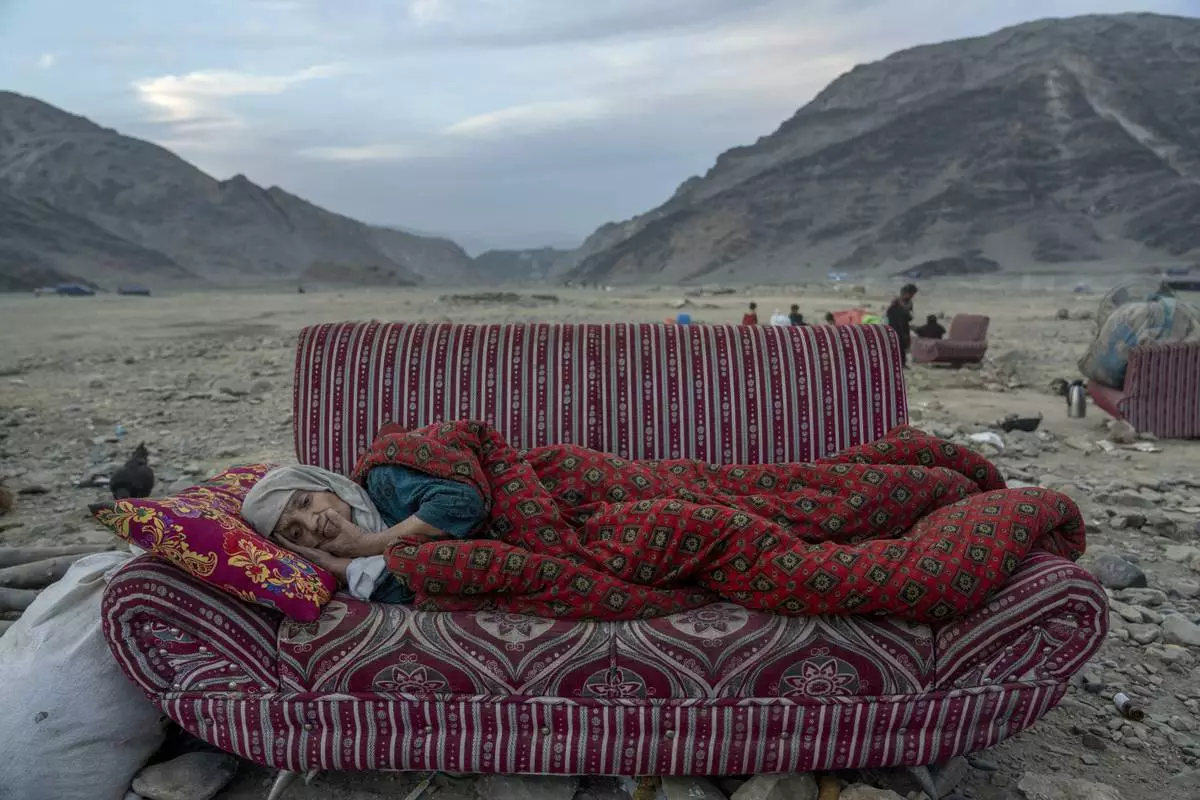
This image provided by World Press Photo is part of a series titled Afghanistan on the Edge by Ebrahim Noroozi, Associated Press, which won the World Press Photo Asia Series category and showsAn Afghan refugee rests in the desert next to a camp near the Torkham Pakistan-Afghanistan border, in Torkham, Afghanistan, Friday, Nov. 17, 2023. A huge number of Afghans refugees entered the Torkham border to return home hours before the expiration of a Pakistani government deadline for those who are in the country illegally to leave or face deportation. (AP Photo/Ebrahim Noroozi)
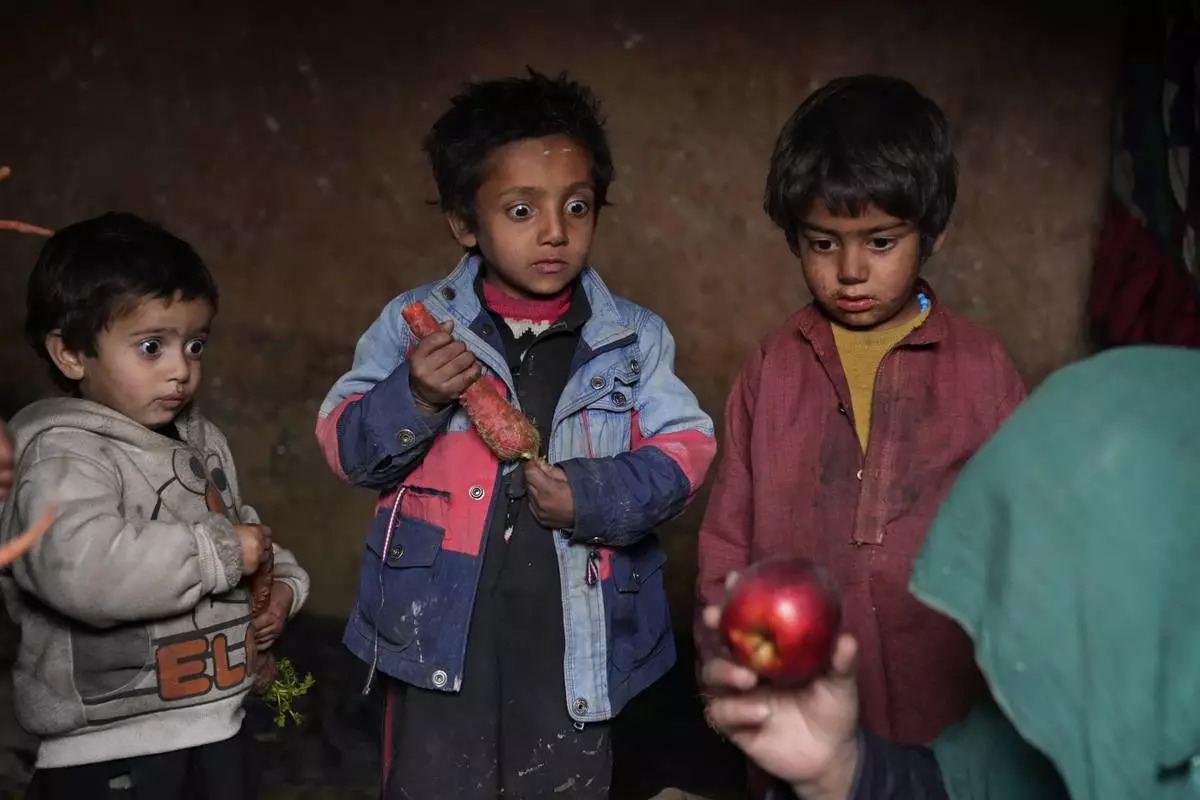
This image provided by World Press Photo is part of a series titled Afghanistan on the Edge by Ebrahim Noroozi, Associated Press, which won the World Press Photo Asia Series category and shows : Since the chaotic Taliban takeover of Kabul on Aug. 15, 2021, an already war-devastated economy once kept alive by international donations alone is now on the verge of collapse. There isn't enough money for hospitals. The World Health Organization is warning of millions of children suffering malnutrition, and the U.N. says 97% of Afghans will soon be living below the poverty line. Three Afghan internally displaced children look with surprise at an apple that their mother brought home after begging, in a camp on the outskirts of Kabul, Afghanistan, Thursday, Feb 2, 2023. (AP Photo/Ebrahim Noroozi)
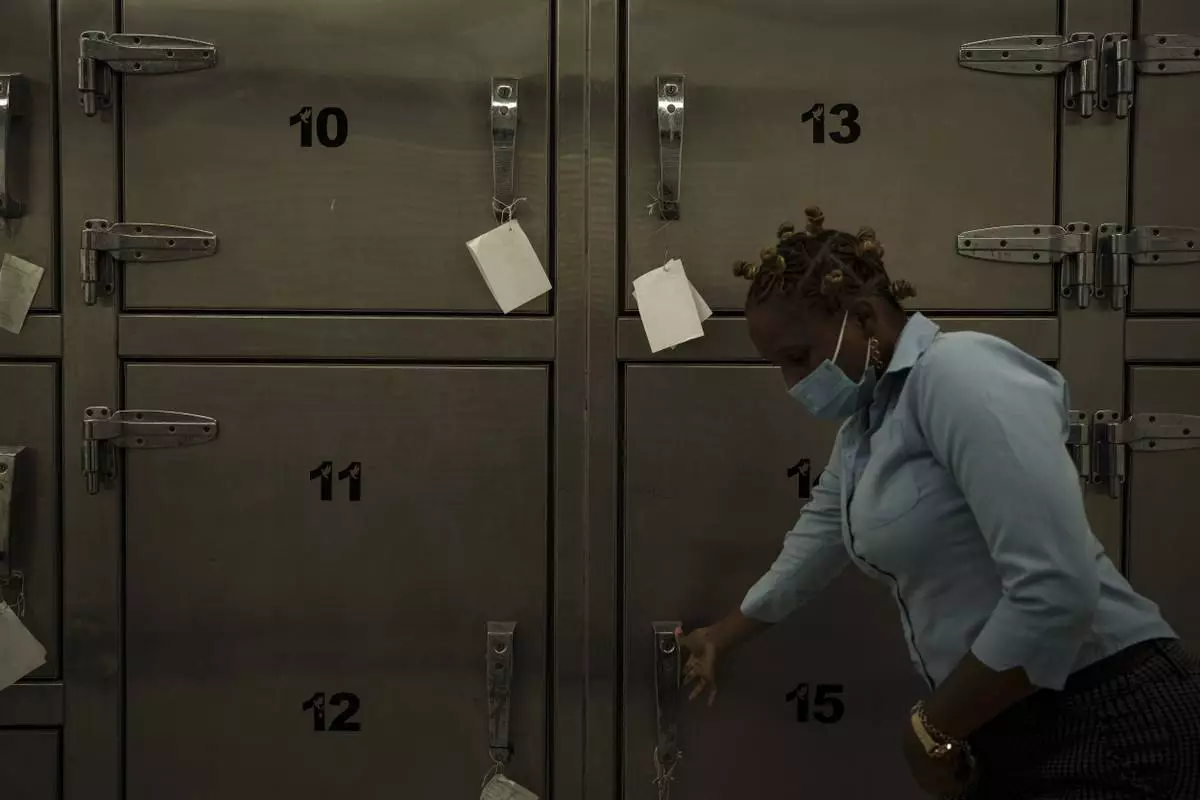
This image provided by World Press Photo is part of a multimedia project by Associated Press' Renata Brito and Felipe Dana titled Adrift, won the World Press Photo Africa Regional Winner Open Format category and shows a mortuary technician opening the door of a refrigerator used to store the remains of migrants recovered from inside the Mauritania boat that appeared drifting near the island of Tobago, in Scarborough, Trinidad and Tobago, Tuesday, Jan. 25, 2022. In May 2021 a boat from Mauritania full of dead men was found off the coast of the Caribbean Island of Tobago. Who were these men and why were they on the other side of the Atlantic Ocean? Two visual journalists sought answers, uncovering a story about migrants from West Africa who seek opportunity in Europe via an increasingly popular but treacherous Atlantic route. (AP Photo/Felipe Dana)
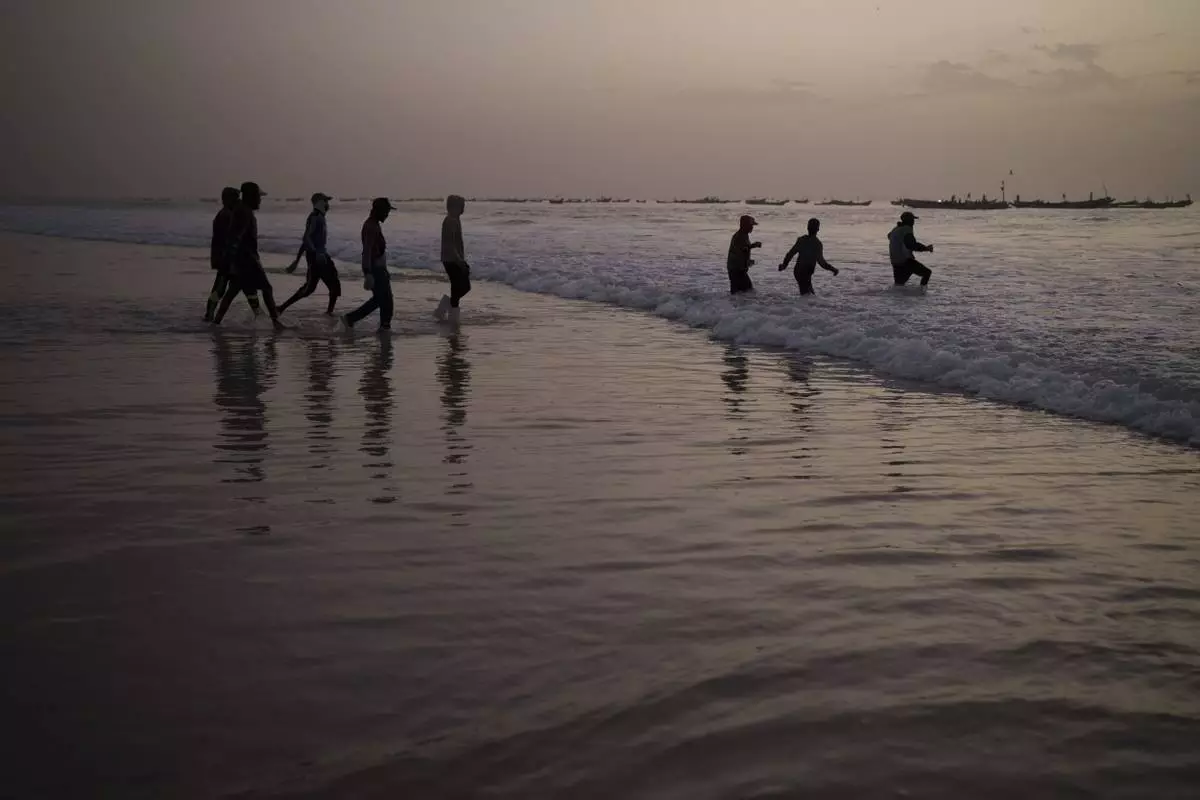
This image provided by World Press Photo is part of a multimedia project by Associated Press' Renata Brito and Felipe Dana titled Adrift, won the World Press Photo Africa Regional Winner Open Format category and shows young fishermen walk into the ocean to board an artisanal fishing boat in Nouakchott, Mauritania, Friday, Dec. 10, 2021. In May 2021 a boat from Mauritania full of dead men was found off the coast of the Caribbean Island of Tobago. Who were these men and why were they on the other side of the Atlantic Ocean? Two visual journalists sought answers, uncovering a story about migrants from West Africa who seek opportunity in Europe via an increasingly popular but treacherous Atlantic route. (AP Photo/Felipe Dana)
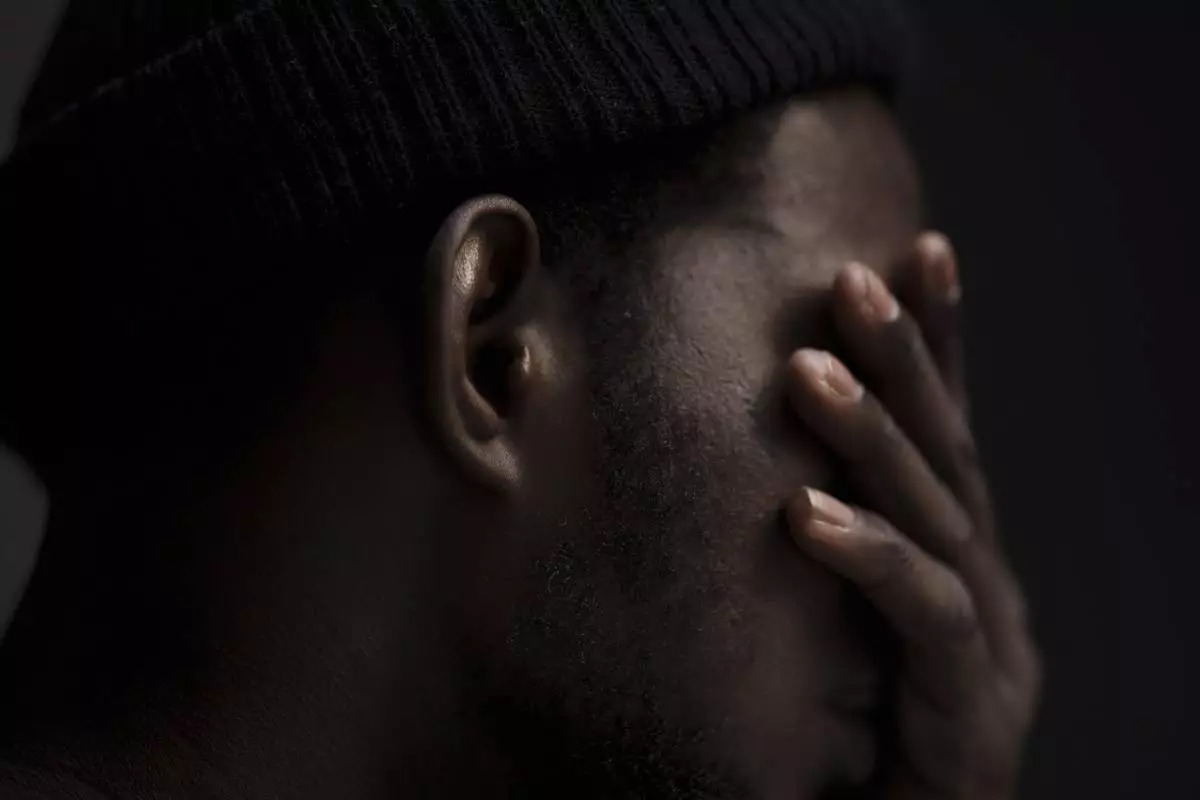
This image provided by World Press Photo is part of a multimedia project by Associated Press' Renata Brito and Felipe Dana titled Adrift, won the World Press Photo Africa Regional Winner Open Format category and shows Moussa Sako, an asylum-seeker from Mali, who survived 22 days aboard a Mauritanian boat drifting in the Atlantic Ocean covers his face during an interview with the Associated Press in Guadalajara, Spain, Sunday, Nov. 14, 2021. In May 2021 a boat from Mauritania full of dead men was found off the coast of the Caribbean Island of Tobago. Who were these men and why were they on the other side of the Atlantic Ocean? Two visual journalists sought answers, uncovering a story about migrants from West Africa who seek opportunity in Europe via an increasingly popular but treacherous Atlantic route. (AP Photo/Felipe Dana)
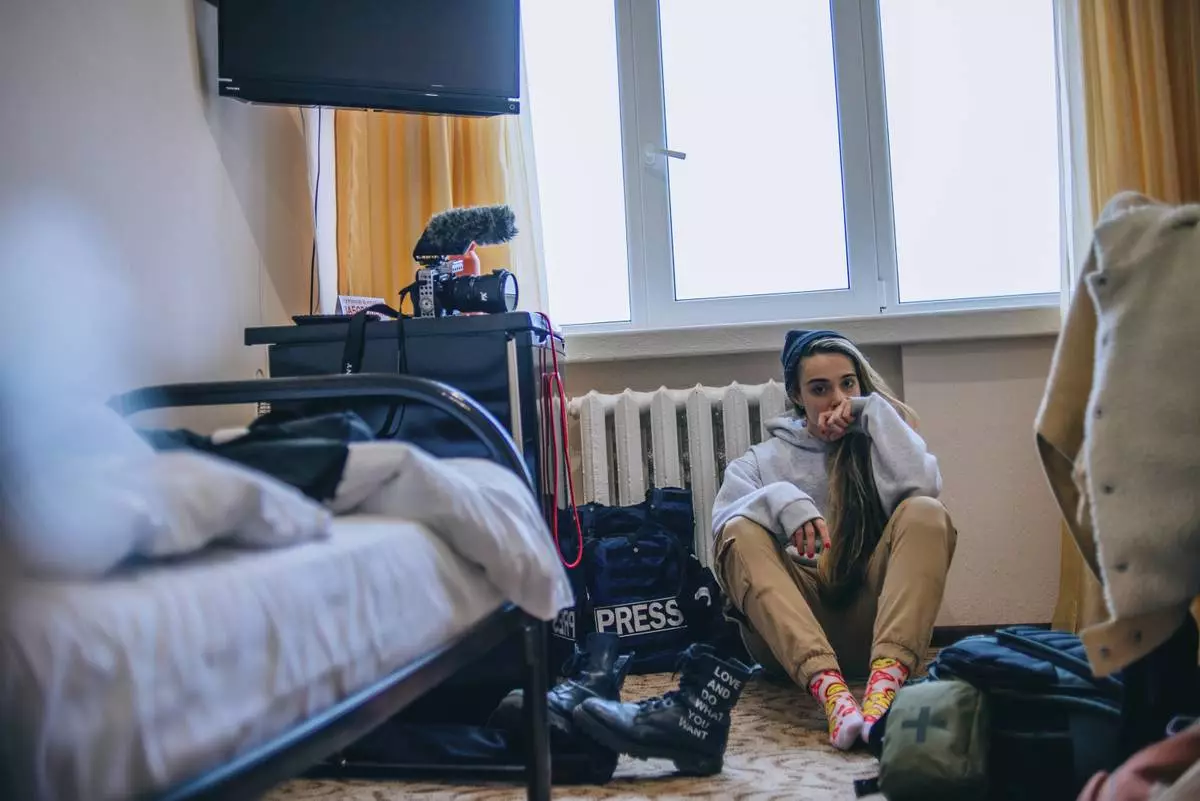
This image provided by World Press Photo and taken by Julia Kochetova is part of a series titled War is Personal which won the World Press Photo Open Format Award. Amidst tens of thousands of civilian and military casualties and an effective stalemate that has lasted for months, there are no signs of peace on the horizon for Russia's war in Ukraine. While news media updates its audience with statistics and maps, and international attention drifts elsewhere, the photographer has created a personal website that brings together photojournalism with the personal documentary style of a diary to show the world what it is like to live with war as an everyday reality. (Julia Kochetova/World Press Photo via AP)
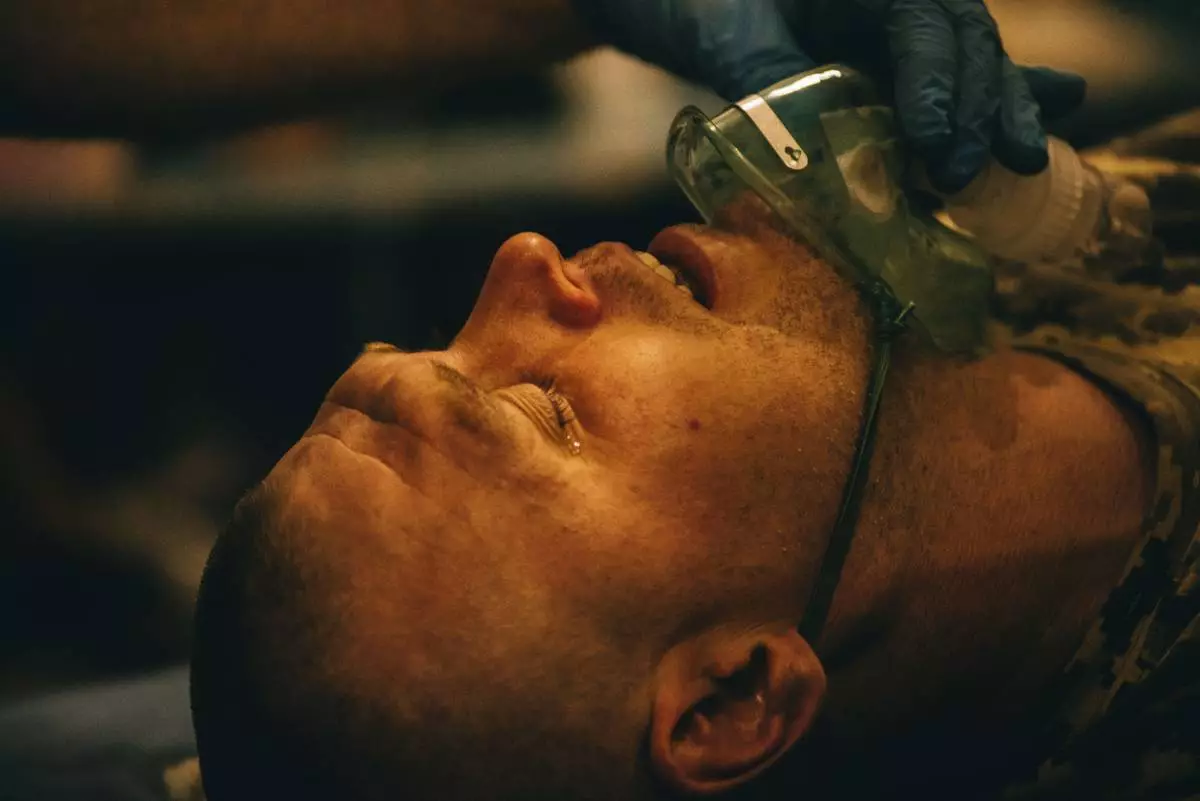
This image provided by World Press Photo and taken by Julia Kochetova is part of a series titled War is Personal which won the World Press Photo Open Format Award and shows a stabilization point near Bakhmut, Ukraine, of the 5th assault brigade and 77th brigade. Hospitalliers battalion - volunteer battalion of combat medics are helping here. Amidst tens of thousands of civilian and military casualties and an effective stalemate that has lasted for months, there are no signs of peace on the horizon for Russia's war in Ukraine. While news media updates its audience with statistics and maps, and international attention drifts elsewhere, the photographer has created a personal website that brings together photojournalism with the personal documentary style of a diary to show the world what it is like to live with war as an everyday reality. (Julia Kochetova/Der Spiegel/World Press Photo via AP)
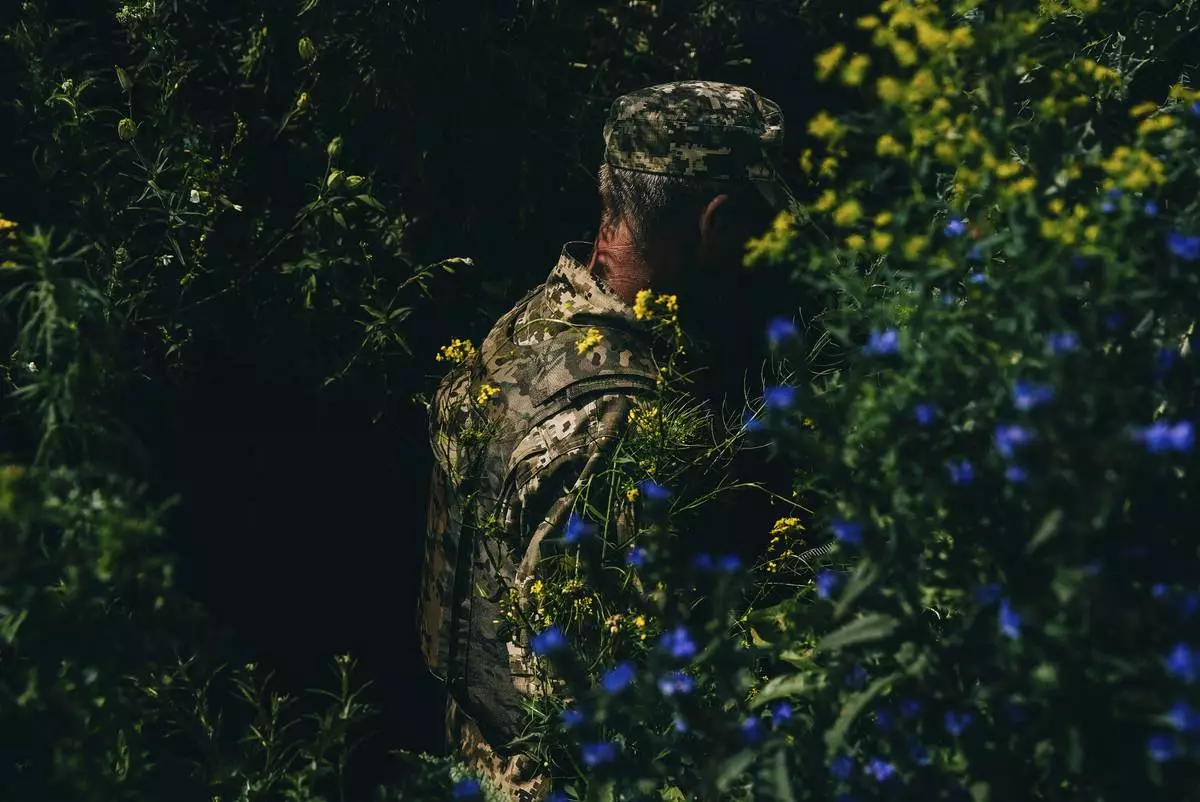
This image provided by World Press Photo and taken by Julia Kochetova is part of a series titled War is Personal which won the World Press Photo Open Format Award and shows the training of mobilized conscripts of 68th brigade in Donetsk region, not far from frontline. 68th brigade recently liberated Blagodatne village during the Ukrainian counter-offensive. The instructors came from US, working for NGO "Saber".Amidst tens of thousands of civilian and military casualties and an effective stalemate that has lasted for months, there are no signs of peace on the horizon for Russia's war in Ukraine. While news media updates its audience with statistics and maps, and international attention drifts elsewhere, the photographer has created a personal website that brings together photojournalism with the personal documentary style of a diary to show the world what it is like to live with war as an everyday reality. (Julia Kochetova/Der Spiegel/World Press Photo via AP)
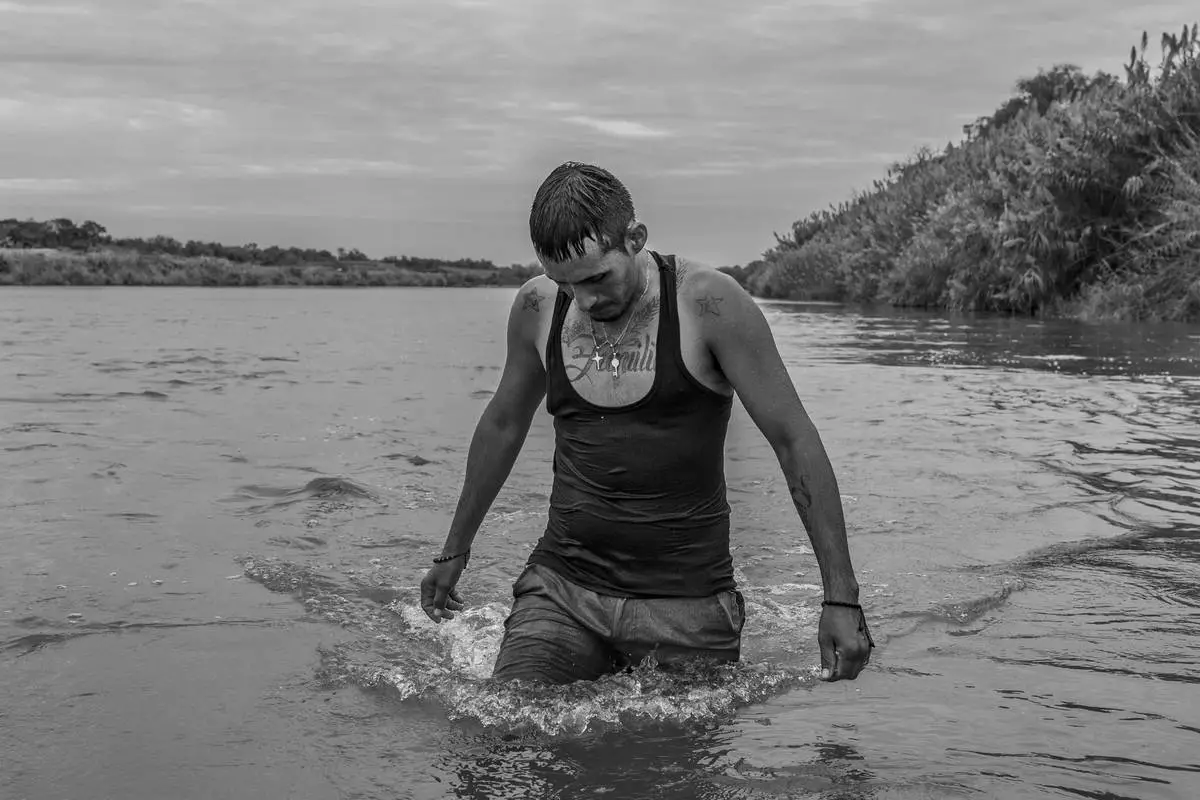
This image provided by World Press Photo and taken by Alejandro Cegarra for The New Times/Bloomberg is part of a series titled The Two Walls which won the World Press Photo Long-Term Project Award and shows Carlos Mendoza, a Venezuelan migrant, crossing the Rio Grande river to seek asylum in the United States. Piedras Negras, Mexico, 7 October 2023. (Alejandro Cegarra/The New York Times/Bloomberg/World Press Photo via AP)
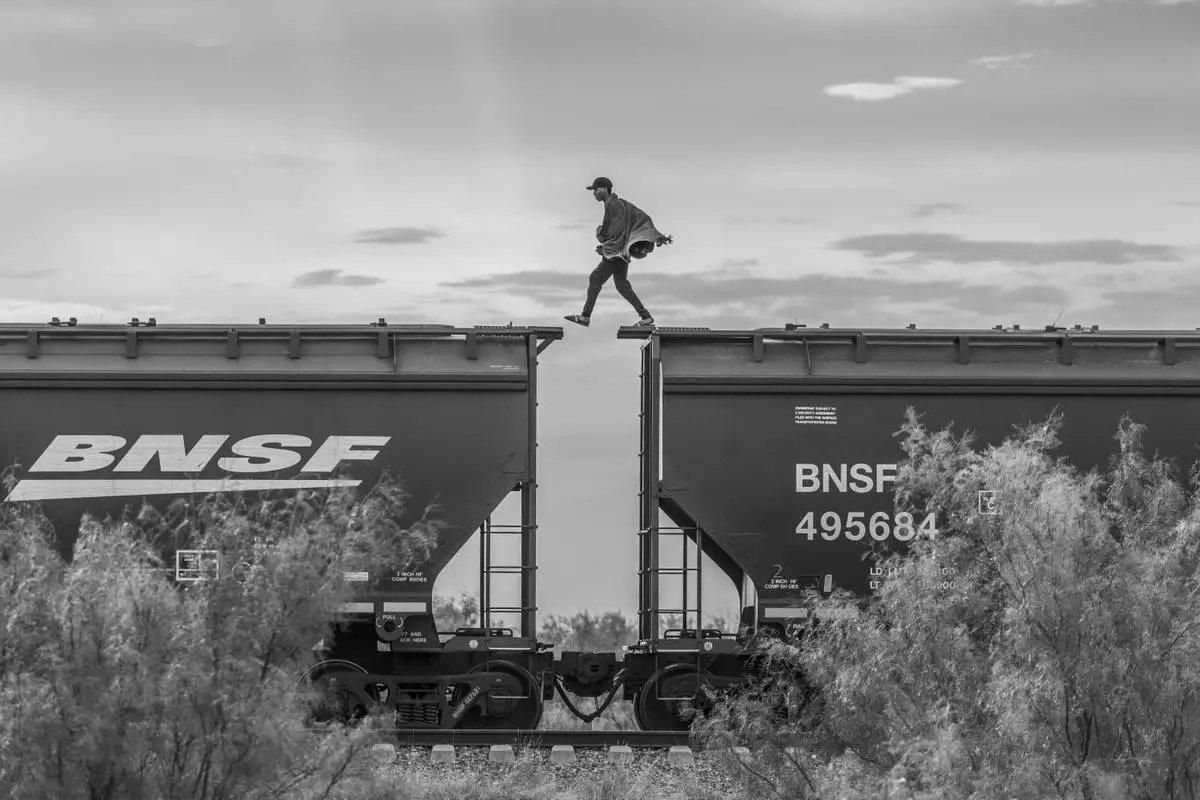
This image provided by World Press Photo and taken by Alejandro Cegarra for The New Times/Bloomberg is part of a series titled The Two Walls which won the World Press Photo Long-Term Project Award and shows a migrant walking atop a freight train known as "The Beast." Migrants and asylum seekers lacking the financial resources to pay a smuggler often resort to using cargo trains to reach the United States border. This mode of transportation is very dangerous; over the years, hundreds have fallen onto the tracks and have been killed or maimed. Piedras Negras, Mexico, 8 October 2023. (Alejandro Cegarra/The New York Times/Bloomberg/World Press Photo via AP)
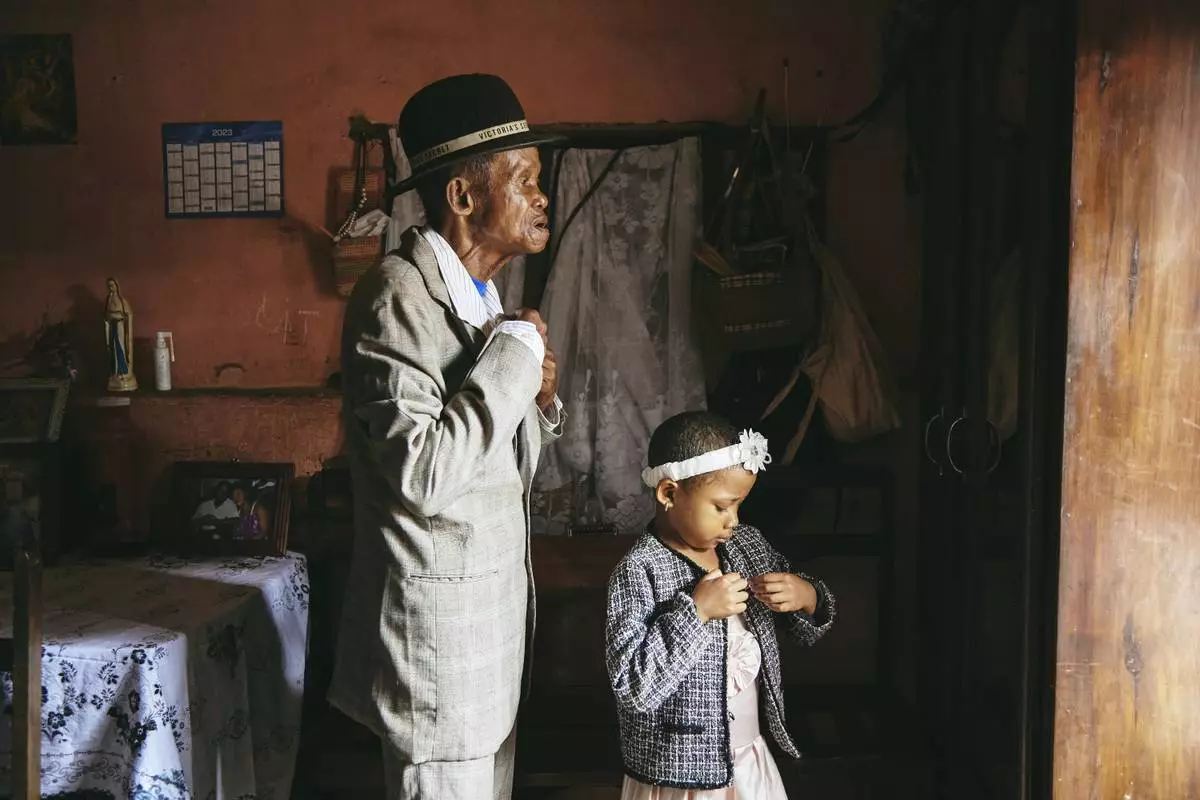
This image provided by World Press Photo and taken by Lee-Ann Olwage for GEO is part of a series titled Valim-babena which won the World Press Photo Story of the Year Award and shows Dada Paul Rakotazandriny (91), who is living with dementia, and his granddaughter, Odliatemix Rafaraniriana (5), get ready for church on Sunday morning at his home in Antananarivo, Madagascar. 12 March 2023. (Lee-Ann Olwage/Geo/World Press Photo via AP)
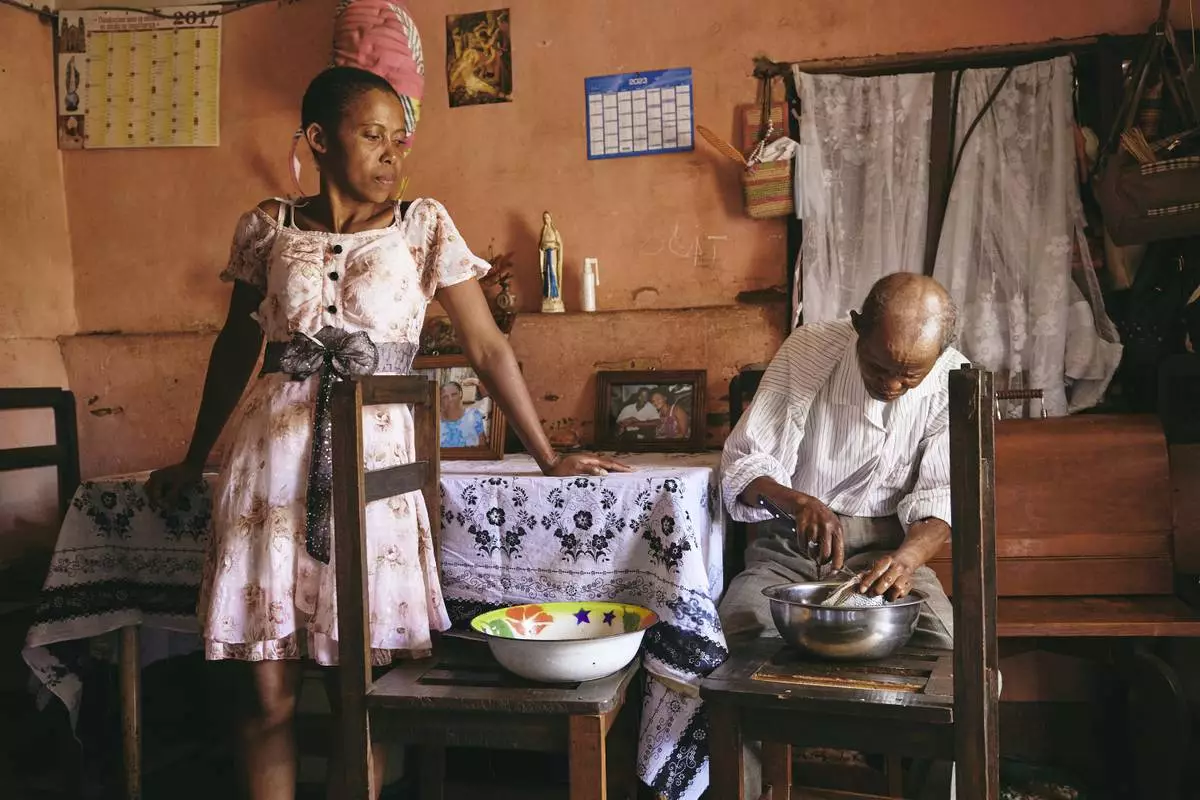
This image provided by World Press Photo and taken by Lee-Ann Olwage for GEO is part of a series titled Valim-babena which won the World Press Photo Story of the Year Award and shows Joeline (Fara) Rafaraniriana (41) watches her father, Dada Paul Rakotazandriny (91) clean fish at home on Sunday afternoon. A typical Sunday consists of the family attending church in the morning and spending time together in the afternoon. Fara works during the week and as the sole provider and carer for her daughter and father struggles to manage all her responsibilities in the absence of assistance by her siblings who live close by. Mandrosoa Ivato, Antananarivo, Madagascar. 12 March 2023. (Lee-Ann Olwage/Geo/World Press Photo via AP)
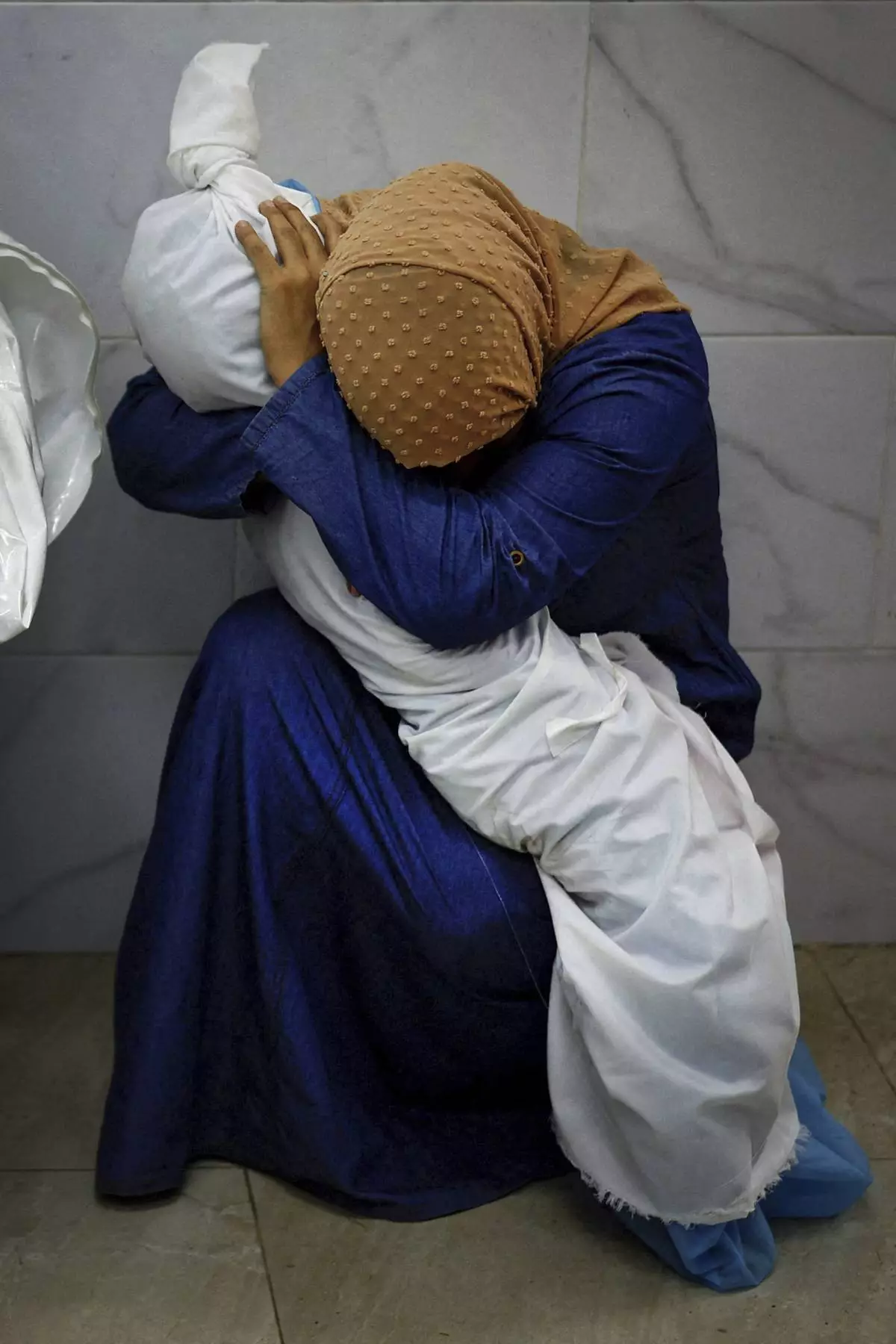
This image provided by World Press Photo and taken by Mohammed Salem of the Reuters news agency won the World Press Photo Award of the Year and shows Palestinian woman Inas Abu Maamar, 36, embracing the body of her 5-year-old niece Saly, who was killed in an Israeli strike, at Nasser hospital in Khan Younis in the southern Gaza Strip, October 17, 2023. (Mohammed Salem/Reuters/World Press Photo via AP)
























